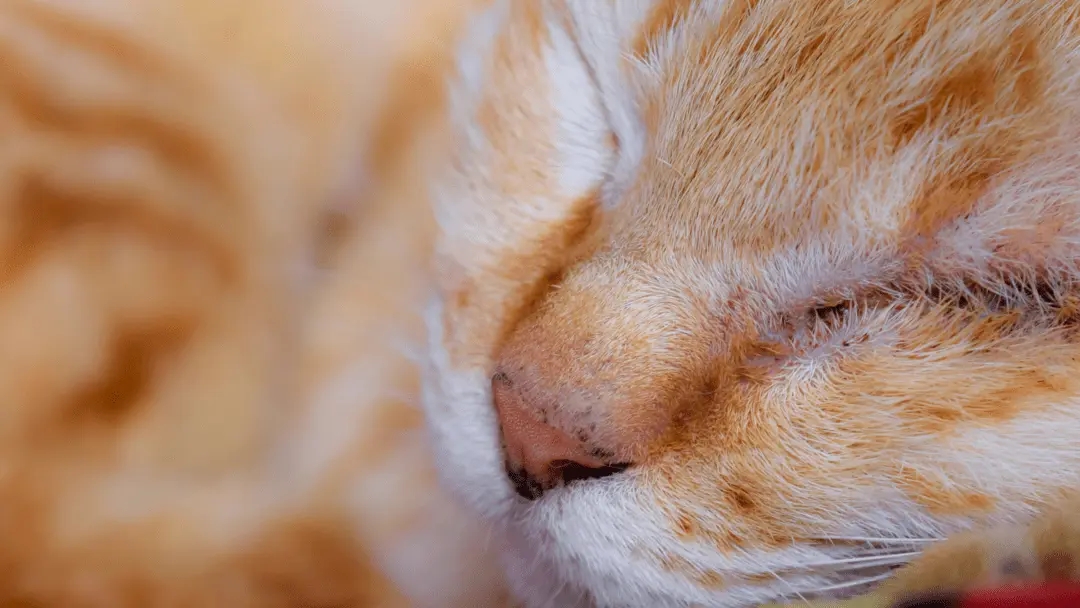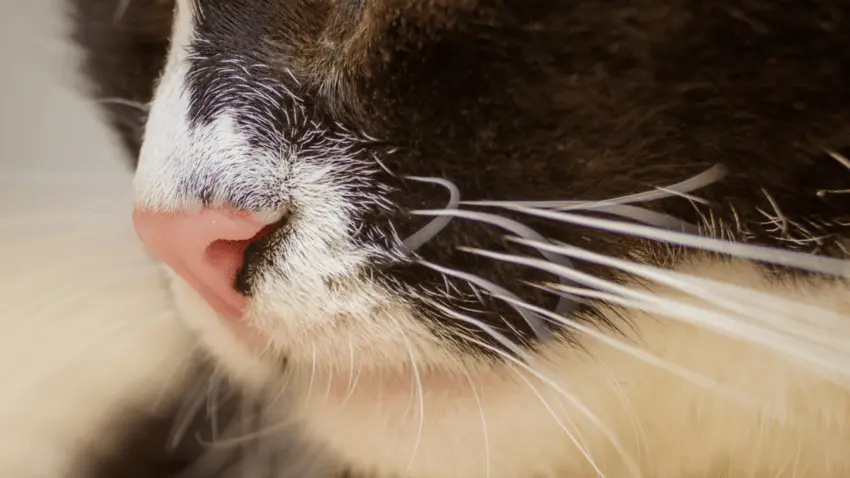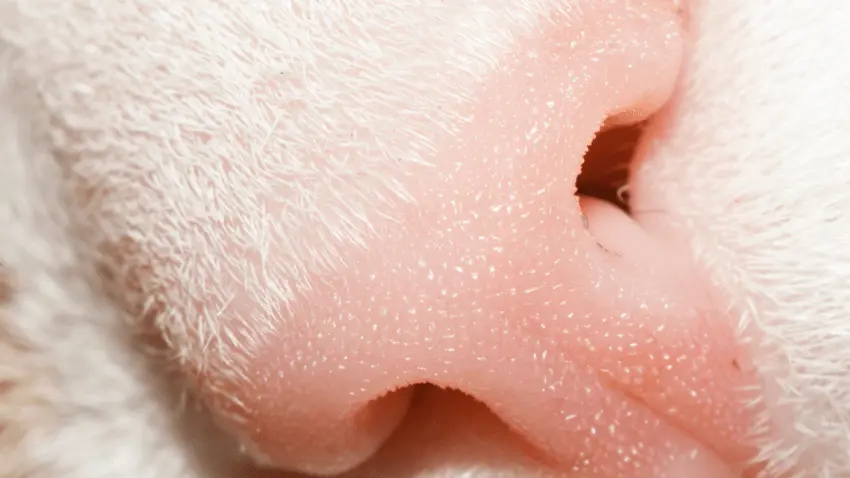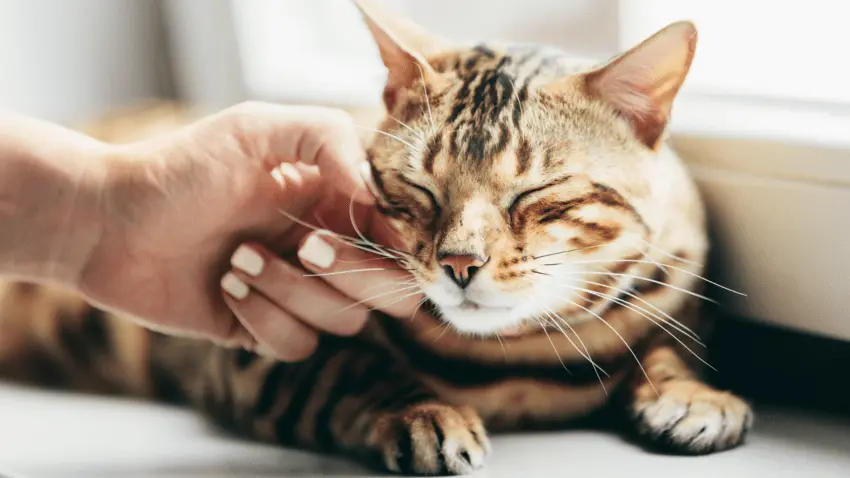Why Do Cats Noses Get Wet When They Purr? Discussed Here!
Why do cats noses get wet when they purr? While purring itself is a positive indication, being accompanied by a drippy nose can point to a potential problem.
Cat owners consider purring as a badge of honor since it means that their pets are happy. It usually happens while petting, grooming, or cuddling the feline.

However, some pet owners notice that their cats’ noses also run whenever it’s purring. In this post, we will explain the possible reasons here and whether it’s something you should be worried about.
Why does your cat’s nose become wet while purring?

Purring and having a wet nose is usually harmless in cats. Still, there are possible health problems that could be the reason for it.
Below are the possible explanations behind this phenomenon on your pet:
1. It means your cat is happy!
It’s normal for cats to have a moist nose and to purr at the same time. This just means that you have a happy and healthy feline.
As long as your cat’s nose isn’t dripping, there shouldn’t be a problem. Take note that even if your cat isn’t purring, its nose will remain moist as part of temperature regulation.
2. Your cat has been licking itself.
Another possible reason behind a wet cat nose while purring is grooming. Your pet may have licked its nose a couple of times, which was accompanied by purring. Please read here: Cat Gags When Purring
However, you should also know that excessive licking and grooming can be an indication of a health problem in felines.
Aside from that, purring isn’t always a positive sign. Some cats will purr when stressed to soothe themselves, which is the same with excessive licking.
If your cat doesn’t seem relaxed while purring and its nose is wetter than usual, you should consider the possibility of stress or anxiety.
3. Your cat has respiratory problems.
Cats purring and having a drippy nose might be suffering from a respiratory infection. This problem is often caused by transmissible viruses or bacteria.
Felines suffering from this problem will have runny noses. The drip may become worse when they are purring.
Nevertheless, if your cat has received all its needed vaccinations, serious respiratory conditions shouldn’t be a concern.
4. Your cat has allergies.
Cats suffering from allergies will exhibit runny noses, whether they are purring or not. Triggers like dust, pollen, spores, and off-gassing could make their runny nose worse.
Usually, kitties suffering from allergic reactions will have a mucus discharge from its nose. Unless the allergen is removed from the surroundings, your cat will continuously deal with a drippy snout.
5. There’s a foreign matter inside your cat’s nose.
A foreign object stuck up your cat’s nose could make a sound similar to purring as the kitty breathes. At the same time, the nose will release mucus to flush it out.
In this case, you should try to inspect your cat’s nose and see if there are unusual presence inside. Most of the time, cats are prone to having blades of grass dislodged inside their nose as they explore outdoors.
The role of wet noses in cats

Take note that a cat’s nose is supposed to be moist, but not dripping wet. This moisture has two crucial roles in your feline’s health: temperature regulation and enhancing smell.
Temperature regulation
Like dogs, cats can’t sweat because they are covered with fur. Still, there are two spots in their bodies that aren’t wrapped in fur: their noses and their paw pads.
With this, cats sweat on their noses, which explains why it’s moist all the time. This allows them to regulate their body temperature, especially during summer.
Moreover, you’ll also notice your kitty’s paw pads getting moist for the same reason. Overall, this is normal and shouldn’t be a cause of concern.
Boosting the sense of smell
A cat’s wet nose allows them to smell their surroundings better. It’s because the scent sticks to the moisture well, allowing them to sniff it deeply.
So if your cat’s nose is wet and it’s purring, it might be a sign that the feline is smelling something it really likes.
A dry nose is not good on felines!
Take note that a dry nose is not a good thing for cats. If your pet’s nose is dry and very warm, it can be a symptom of an infection or fever.
It’s important to bring your cat to the veterinarian if its dry nose isn’t resolving for days. This is much so if your pet is starting to exhibit other adverse symptoms like lethargy and poor appetite.
Overall, the treatment of a cat’s dry nose depends on the root cause of the condition. Only the veterinarian can identify the problem and provide the necessary treatment.
Why does my cat drool whenever he purrs?
Drooling while purring is a sign that your cat is super relaxed. It’s like when you’re getting a nice massage and you’re starting to fall asleep.
However, drooling can also be an indication of a bigger problem. For example, cats drool whenever they are in pain or suffering from gastrointestinal upset.
Aside from that, kitties will dribble when they got exposed to a toxin. It’s important to observe your cat and the circumstances surrounding their drooling.
Why does my cat snort when he purrs?

Some cats can’t purr properly, which causes them to snort when they try to do so. It can be due to their anatomy or an undiagnosed health problem.
For example, a cat’s purr may sound like snorting due to the variation in its airway structure and nose shape.
On the other hand, snorting while purring can be due to irritation along the nasal passages. If you’re worried, it’s best to consult a veterinarian to know the exact condition of your pet.
Why does my cat grunt when he purrs?
Grunting is usually a warning signal from cats when they are stressed or angry. It also means that the kitty wants to be left alone.
While grunting isn’t typically a good thing, some cats will make this sound to get your attention. It can even be followed by purring, especially if you provide what they want.
However, you should also know that grunting might be due to narrow or blocked airways. You should get your cat checked if the grunting is getting louder or occurring for no reason.
Why is my cat’s nose dripping with water?
A watery discharge from a cat’s nose is usually due to a respiratory infection. Felines can catch common colds, too, which leads to watery or mucus-filled nasal discharge.
Aside from that, inflammation and trauma in its nasal area can also trigger a drippy discharge. If possible, you should consider bringing your pet to the vet’s clinic for proper diagnosis.
Should I pick my cat’s boogers?
Avoid picking your cat’s boogers with your bare hands. Instead, you should use a damp cloth soaked in warm water.
This will help soften up the dried booger and remove it without hurting your cat’s nose. Take note that a kitty’s snout is sensitive, so you should always be gentle.
Also, expect your cat to have more boogers if it has nasal discharge. It’s important to wipe it regularly to avoid a crusty and thick buildup.
Why does my cat dribble when we cuddle?
Many cats drool whenever they are happy, which is why your pet dribbles while being cuddled. It’s a common occurrence and unlikely to be a cause of concern.
As long as the drooling doesn’t occur randomly throughout the day, you don’t have to worry about your pet’s dribbling.
Conclusion
Why do cats noses get wet when they purr? This can be a typical expression of happiness and satisfaction.
However, if your cat’s nose is getting drippy, you should have it checked for respiratory issues or foreign matter being stuck in its airway.
Overall, a wet cat nose is normal and nothing to be worried about. After all, cats use this to regulate their body temperature and enhance their sniffing game.
